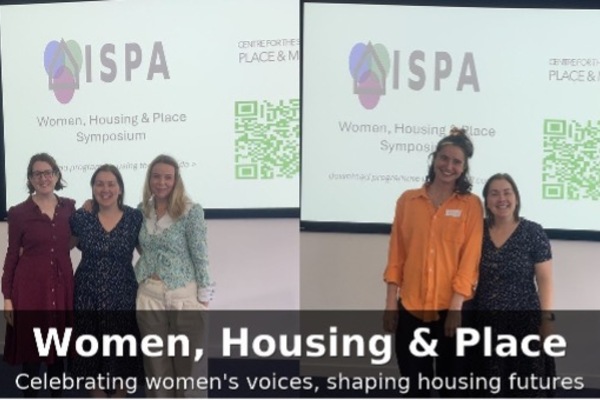Ellie Suh, a PhD candidate in the Department of Social Policy at the London School of Economics, discusses findings from her recent research on the role of family financial support in young British adults’ entry to homeownership. This blog is based on the work presented at the HSA 2019 conference in April for which she received a bursary to attend.
It has become more difficult to own a home in Britain, particularly if you’re a young person under 45 years of age. Many remain in the private rental market, earning a nickname of ‘Generation Rent’. Affordability is the biggest issue; most struggle to save for a deposit for their first home. The younger generation’s pathways to homeownership looks different from those of previous generations. More young people are staying with or moving back to their parental home to save on living costs – a recent phenomenon referred to as ‘Boomerang Generation’. Some others manage to get on the property ladder with the help of their ‘Bank of Mum and Dad’.
Policymakers and academics have become increasingly serious about this generation’s reliance on parents. Those tapping into the ‘Bank of Mum and Dad’ (BOMADs) are a good example, with one estimate suggesting that BOMADs collectively lent around £6.5bn to their offspring in 2017, roughly the same amount of mortgage loans provided by the 10th biggest mortgage lender in the UK, TSB Bank. Banks have found a new market; Lloyds Bank, Nationwide and Barclays are marketing new mortgage products for first-time buyers that directly connect to their parents’ wealth.
On the other hand, a new kind of financial support is on the rise – saving on living costs by moving back to live with parents. Official figures show that the proportion of young people who are living with their parent(s) is increasing. Recent research reported that many do so to reduce living costs (West et al, 2017), possibly to save for a deposit more quickly. BOMAD children and the boomerang generation receive different kinds of family financial support – one helps directly, while the other does so more indirectly. But, in the end, both help the younger generation by boosting their capacity to save for a deposit for a home or replacing the need for saving altogether, giving a head start in the housing market.
The problem is that not everyone has access to such help, and the availability or magnitude of support can be very different. This raises some important questions on the future of the British housing market and about the issue of inequality. First, if it has become difficult to own a home, who are the owners who already own homes? Among those who do not own a home, does having the parental support of either type increase the chances of getting on the housing ladder? These are the questions I have been looking at in a research paper, which was presented at the Housing Studies Association (HSA) conference in April 2019. I used four sweeps of the Wealth and Assets Survey (WAS), which covers the period 2008/10[i] and 2014/16.
I found that homeownership for the younger generation is not only related to their own socio-economic status but also that of their parents. Parental homeownership during adult-children’s teenage years and receiving any direct financial help (inheritance, cash gift or loans) over £10,000 from family and friends are two big factors that distinguish homeowners and non-owners in 2010/12. Of course, it may be that growing up in an owner-occupation household means that children also aspire to own their own home, and so focus their efforts on it once they become adults. But it seems clear that there is a strong intergenerational link in the parent’s and children’s homeownership circumstances.
The second part of the research focused on the non-owner population and followed them from 2008/10 until 2014/16 to quantify their chances of entering the housing market. Not surprisingly, the chances of renters under 45 years old in 2008/10 moving to homeownership were higher for those in the higher socio-economic status. But, those with financial help greater than £15,000, or those who have lived in the parental home, were more than twice as likely to move into homeownership compared to others without any financial support.
Simply put, the inequality within the baby boomer generation is transferring downwards to the younger generation. Owning a home is a crucial part of how people organise their lives in the UK, not only for gaining autonomy but also for family life. Therefore, helping children to become homeowners may be one of the most natural courses of action for parents to take. However, there are systematic (dis)advantages that create unequal starting points already from the early stages of adult life, incurring other social costs in the long run.
Policies such as Help to Buy were implemented to improve homeownership circumstances and chip away at inequality. However, Bert Provan (2017) at the Centre for Analysis of Social Exclusion (CASE) argues that such policies only benefited those who were already better off. Other experts on British housing reveal a more difficult problem to overcome: the market works based on the balance between demand and supply, but the policies have been heavily focused on the demand side, without meaningfully improving the supply side.
And what about the parents? If adult-children do much better with parental support, then would parents opt to support their adult-children instead of funding their retirement or care? A recent study from the Institute for Fiscal Studies reported that the median financial wealth held among those aged between 55-64 in 2014/15 is £21,000 (Crawford, 2018), well below the average deposit of £33,000 estimated by Halifax in 2018. Parents might be taking out a further debt, which becomes a new source of financial insecurity when they become older.
The results of the study reiterate the increasing inequality and potential knock-on effects to other generations. The British adults in their early stages of life need more secure and affordable housing options. As more secure and affordable options become available, with a collective policy decision on dealing with BOMAD, both housing anxiety and intragenerational inequality will reduce. Also, there is an urgent need to introduce housing market health checks, such as increasing tenants’ rights and controlling rent in the private sector. Changes are underway; in England, there has been a rent control debate recently in parliament, and the Mayor of London Sadiq Khan stressed the need for such control. In Scotland, the Private Housing (Tenancies) (Scotland) Act 2016 was introduced. But it is important to remember that, these new initiatives must be concurrently implemented with an increase in the affordable housing stock, for such policies to have long-term effects.
[i] 2008/2010 refers to the period between July 2008 and June 2010.
References
Crawford, R. (2018). The use of financial wealth in retirement. In IFS Briefing Note (Vol. BN236). London.
Provan, B. (2017, October 23). How ‘Help to Buy’ helps mainly the privileged. British Politics and Policy. Retrieved from http://blogs.lse.ac.uk/politicsandpolicy/how-help-to-buy-helps-the-privileged/
West, A., Lewis, J., Roberts, J., & Noden, P. (2017). Young Adult Graduates Living in the Parental Home: Expectations, Negotiations, and Parental Financial Support. Journal of Family Issues, 38(17), 2449–2473. https://doi.org/10.1177/0192513X16643745







